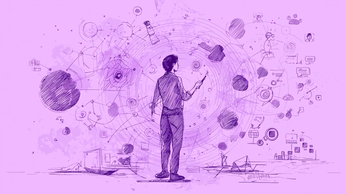
The Great Coronavirus Reset: Five New Bretton Woods Institutions For 21st Century’s Exponential Challenges
Before the COVID-19 crisis, our global institutions were on the brink – this pandemic has pushed them over the edge.
When the world recovers from this crisis – and it will – society and the global economy will look very different.
The world faces a choice: whether to build back the same governance institutions – centered around traditional economic growth, traditional approaches to the environment, healthcare, education, public service delivery - or a new set of institutions that are better suited to the needs of the 21st Century. The institutions that worked for the past 80 years, may not be the same institutions the world needs for the next 80 years to the end of the century, given new challenges and new technologies available to help them function more effectively.
Prior to this crisis, cracks had already appeared in every global institution. Each institution could be placed into three categories: ‘still fit for purpose,’ ‘needs to be enhanced,’ or ‘no longer relevant.’ Economic growth institutions that have been core to the modern financial system for 100 years - such as Central Banks, the IMF and the World Bank - have been criticized for growth policies that inadvertently led to greater inequality in recent decades, and not doing enough to reduce global carbon emissions. Environmental Governance Bodies are not making enough progress relative to the challenge the planet faces, as new climate leaders like Greta Thunberg emerge. Decades-old approaches to Healthcare, Education and Public Services, all need to be radically rethought and retooled, as the COVID-19 pandemic is making more apparent every day.
Ministers of Finance, Central Bank Governors and Global Banking CEOs will meet in April for the Spring Meetings of the World Bank and IMF – for the first time, being held virtually in three weeks’ time. An unprecedented multilateral, multitrillion dollar stimulus package to restart the global economy is on everyone’s mind. Already in just the past week we have seen the US debate a $2 trillion stimulus package, the European Central Bank announce a $800 billion pandemic emergency purchase program, Germany announce a $600 billion lending package via its state-controlled banks, the UK announce a $400 billion package, and yesterday the Federal Reserve announced unlimited QE.
The projected numbers are even more daunting (much larger than the 2008 banking crisis), but also present bold new opportunities if Ministers could just pause and reflect for a brief moment whilst following stay-at-home guidance. What are the lessons from previous bailouts, and how can the world be more thoughtful this time, to ‘build back better.’ This has been the message to countries hit by natural disasters such as Hurricane Maria in 2017. How can this thinking now be applied to the global economy?
The 1944 Bretton Woods Conference

Most of today’s National and Global Institutions were built 80 years ago in the aftermath of the Second World War. This was the period when iconic foundations of the global order were set in place, such as The Universal Declaration of Human Rights, the United Nations Security Council, the invention of GDP in the 1930s after the Great Depression, the Bretton Woods Institutions of the World Bank and IMF. Subsequent developments soon led to the creation of WHO, UNEP, UNDP, GATT (that became the World Trade Organization), which are now key pillars of the global governance system.
It took a crisis as deep as WW2 to imagine a future for the 20th century, and build institutions to achieve this positive vision. In the UK, the Beveridge Report in 1942 described a war against the ‘5 Giants’ of Want, Disease, Ignorance, Squalor and Idleness. This was the foundation of the modern Welfare State that became centered around the National Health Service, Comprehensive Education, Social Security, Unemployment Benefits, National House Building Efforts. This was replicated in many countries around the world.
A revolutionary moment in the world's history is a time for revolutions, not for patching.Sir William Beveridge (1942)
Five Exponential Challenges of the 21st Century
As we enter the third decade of the 21st Century, the world faces no smaller giants than the Five Global Challenges that will define the next 80 years due to the nature of their exponential growth, and the tipping points they will push our planet towards.
1. Prosperity and the future of work

Capitalism and work will be radically different by the end of the century, and accelerated by the COVID-19 crisis. Current consumption patterns will not support the additional 3 billion middle class households emerging in the next 2 decades, whilst keeping within our planet’s resource boundaries. Some industries will need to end, such as fossil fuel industries, single use plastics and the wildlife trade. At the same time, innovative new industries will emerge around the space economy, synthetic biology, autonomous transportation, among others. Radical new tools will redefine the future of work, with more remote working, flexi-working, distributed teams, artificial intelligence, virtual reality. New leadership will be needed for this world, which will also need to be more gender balanced, representative of other minorities, and ensure more equal economic outcomes that benefits all of society.
2. Planetary Health

No-one can escape the science that the planet is teetering on the edge. On climate change, we are have already exceeded the 350 parts per million budget that stabilizes our atmosphere and prevents an irreversible tipping point. Climate Change is just one of the big environmental challenges pushing the planet beyond safe operating levels. The mass extinction of biodiversity, the looming water shortage crisis, air pollution, ocean acidification, are some of the other major challenges that need to be radically reversed. These are inextricably linked to our current economic, financial and political decisionmaking system. Bold new institutions need to be established to replace currently ineffective ones and set a new course for our planet.
3. Health and Wellness

We are in the midst of a medical revolution, that has now been accelerated through the COVID-19 virus. New technologies have improved our understanding of disease, health, happiness and society, with advances such as artificial intelligence, more improved treatment options, and greater understanding of mental health (or brain fitness approaches) all part of a bold new wellness future. Infectious diseases are foremost on our minds today, but technology is enabling radical new ways to address chronic diseases such as cancer. Advances in bio-technology and personalized medicine will mean new governance challenges for the 21st century to ensure fair access for all, personalized medicine, and keep health system budgets manageable. Governments are appointing Ministers of Happiness as this becomes an increasingly important objective for citizens around the world.
4. Future of Learning

Our education systems have been a product of Victorian era factory systems, with many efforts at reform in the last 20 years. However, greater understanding of how our brains work, a world of continuous learning, and a future where new industries defined by technologies such as Artificial Intelligence, will all mean different skills will be valued than are currently being taught at schools. A radical rethinking of education is needed, and the COVID-19 crisis is accelerating the debate around non-classroom teaching methods, novel methods of examinations, and the overall purpose of education.
5. Governance

The Institutions that define national and global governance will need to be rethought. Trust is at an all-time low of political parties, the challenges of fake news, rising corruption indices, and opaque decisionmaking processes within many institutions. The influence of crowds, better data, decentralized systems, algorithms, remote working, all mean that new tools could radically retool the systems that govern public services such as Human Rights, Natural Resource Management, Security in a digital world.
Exponential Organizations
Institutions built in the 20th century were built with linear tools – top down structures, powerpoint-driven linear meetings, large centralized office headquarters. Are these really the institutions we wish to return to, when the world demands greater agility, responsiveness and flexibility in an ever more complex world.

The 21st Century will be defined by radically new institutions – ones that work for both our minds and our hearts. For example, why can we not use Artificial Intelligence that uses satellite imagery and individually identifies polluters to then issue automatic fines. Augmented Reality, Virtual Reality, algorithms and the wisdom of crowds are all technologies that need to define the institutions that will shape the 21st Century. There is also the need to radically increase the scope of compassionate institutions who can demonstrate greater trust and empathy with citizens around the world.
These types of organizations were named ‘Exponential Organizations’ by author and entrepreneur Salim Ismail. Just as our challenges today (such as the COVID-19 virus) has spread exponentially, we need exponential organizations – not linear organizations – that can also rapidly scale to meet these new demands.
The world has a choice: either a Mad Max Future or a Star Trek Future. Which path should we take?Salim Ismail (author)
Organizations who are unable to move with the times will get left behind, as relics of the past, as the League of Nations, the Gold Standard, East India Trading Company and other once-iconic institutions that did not move forward with each industrial revolution.
A new Bretton Woods Summit for the 21st Century
In the depth of WW2, the best thinkers of the time met in the US town of Bretton Woods in New Hampshire, to define the Institutions that became known as the IMF and World Bank. It was truly a renaissance moment against the backdrop of the horrors of war.
The Bretton Woods Summit of the time discussed the nature of post-war recovery, reconciliation and reconstruction.

At a time today, when world leaders will be announcing multi-trillion dollars of stimulus packages to keep workers employed, decide which industries survive and which ones close, there is an opportunity to pause and think about the future. Having an ethical and inclusive North Star at which to aim, can help shape the nature of this economic stimulus package. For example, ensuring there are binding low carbon targets as one of the core requirements to receive public funding.
Given the collective consciousness this crisis is raising around the world and the challenges that face us in the years to come, is there a need to convene such a similar conference for the 21st Century? One that is more inclusive, more gender balanced, more reflective of the Global South, and needs of all age cohorts and society. Essentially an ‘exo-skeleton’ for global institutions to help them function more effectively in the century to come.
As is fitting with the times, the only way to achieve such a Summit during the Covid-19 pandemic would be to do so virtually. That in itself could define how these new institutions will need to run.
ExO Insight Newsletter
Join the newsletter to receive the latest updates in your inbox.






